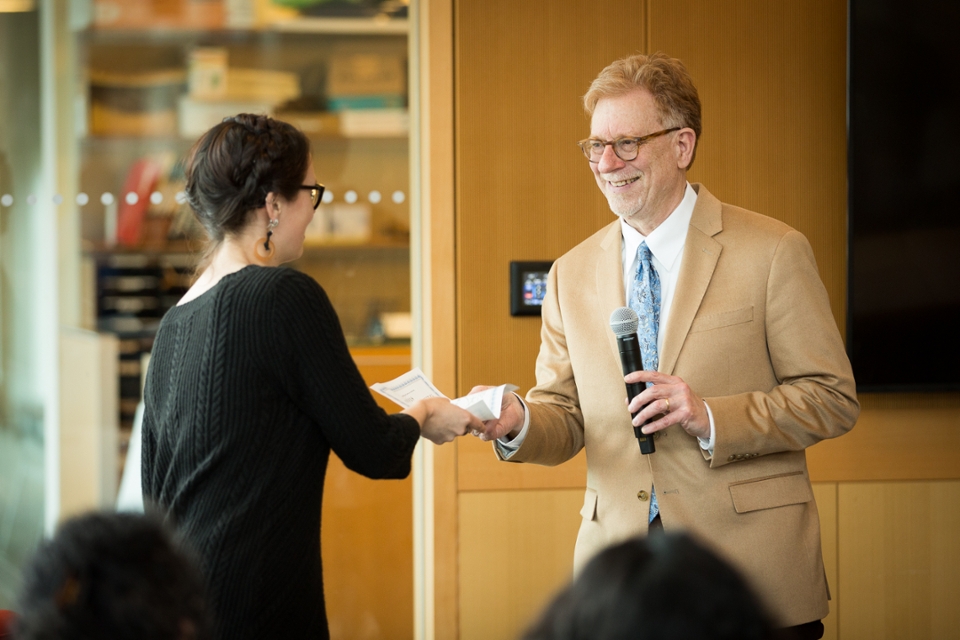GSAS Honors Outstanding Teaching Fellows

Photo Credit: Simon Goodacre
April 30, 2018
Simon Goodacre | Graduate School of Arts and Sciences
Each year, the Graduate School of Arts and Sciences asks each program to nominate an outstanding teaching fellow to be honored at a reception with the deans. This year, Susan Birren, the dean of Arts and Sciences, and Eric Chasalow, the dean of GSAS, presented the awards on April 30 in the Mandel Center. Teaching fellows provide invaluable support to undergraduates and faculty, and the award recipients represent the very best student educators that Brandeis has to offer.
Some teaching fellows were very geared up for the experience. “I can remember as a undergraduate how helpful the teaching assistants were when I needed clarifications on material from class or someone to provide guidance on courses to take or career paths to look into,” says Laura Paige, who received the award in Psychology. “I always hoped I was that type of teaching assistant for someone else!” Others were not so excited. Rachel Polinsky, who was nominated by the Classics department, remembers her first lecture as being “incredibly nerve-wracking.” She went on to say, “I always have felt comfortable giving a presentation but teaching a 50 minute to an hour and a half class was a totally new thing for me.” Christopher Konow, who received the award for Chemistry, had similar feelings, admitting, “TAing was the one thing I wasn't sure about” as he began his graduate studies. “I figured that I could do science well enough, but teaching is something I've never really had any experience with outside of one-on-one tutoring.”
Many award recipients were particularly struck by the curiosity of the undergraduates in their classes. “I was not fully prepared for how many questions I would be asked,” says Konow. “The students think outside the box on how to do the lab, which I was not expecting.” Maya Dworsky, who received the award in Anthropology, is “astounded by how bright, insightful, and hardworking Brandeis students are,” adding, “They are easily the best part of my day.” The teaching fellows found the work particularly rewarding when their students applied the strategies they had learned in other classes. “I ran into a student from my fall class,” says Abigail Arnold, who was nominated by the University Writing Seminar. “He told me that the writing strategies from our class had helped him a lot in his Anthropology course this semester.”
Teaching fellows often build personal relationships with their students. “During my own experience as a student and through observing my own students I found that, while I cannot take away their stress and anxiety, I can still show my support and hopefully ease the pressure overall,” says Polinsky. “I think that teaching is equal parts presenting knowledge and human connection, so learning skills is just as important as the information presented.” Teaching fellows also come in handy when students need a little advice beyond classroom material. “There are students who at times need to be reminded that sleeping, drinking water, and going to the doctor when you're sick are part of learning how to be a successful adult and scholar,” says Dworsky.
The teaching fellows uniformly agreed that their abilities as instructors improved over the year. “Each faculty member and each course has taught me something new about good teaching practice, even including what not to do in the classroom,” says Paige. “All of these different experiences have helped me to become more confident in my abilities and, hopefully, a better resource for students in the classroom.” However, even experience teaching fellows encounter challenges. Janna Lowensohn, who received the award in Physics, was particularly proud of a lecture she gave on Einstein's theory of special relativity this semester. “We had discussed the space-time continuum and how this can lead to unexpected in measurements of length and time,” she says. When she asked for questions, “a student raised her hand and just said ‘Nope!’ I still haven't found a good response to that,” she concedes.
Perhaps the most important service that a teaching fellow provides is moral and emotional support. This point was driven home by an interaction Dworsky had when a student “expressed insecurity about their non-traditional background and the fact that they were a ‘weirdo,’” she says. “I explained that I had never finished high school – but after working my way through community college, transferring to a four year university, and weirdly finding myself in a PhD program, I realized that the higher you go in Academia, the more weirdos you find.”
The 2018 Outstanding Teaching Fellows are:
Maya Dworsky, Anthropology
Chris Konow, Chemistry
Rachel Polinsky, Classics
Jeremy Rapaport-Stein, Music Composition
Yuchen Zhang, Computer Science
Jacob Burg, English
Nataliia Laas, History
Chie Ueda, Life Sciences
Charlotte Rose Morris-Wright, Math
Christina Dioguardi, Musicology
Alaa Murad, NEJS
Janna Lowensohn, Physics
Kelly Stedem, Politics
Laura Paige, Psychology
Samantha Leonard, Sociology
Abigail Arnold, University Writing Seminar
Elizabeth Olson, Women’s, Gender and Sexuality Studies






